Economics majors are inspired to learn about a broad range of social and global issues. Learn about the Oxy experience for some of our current majors.
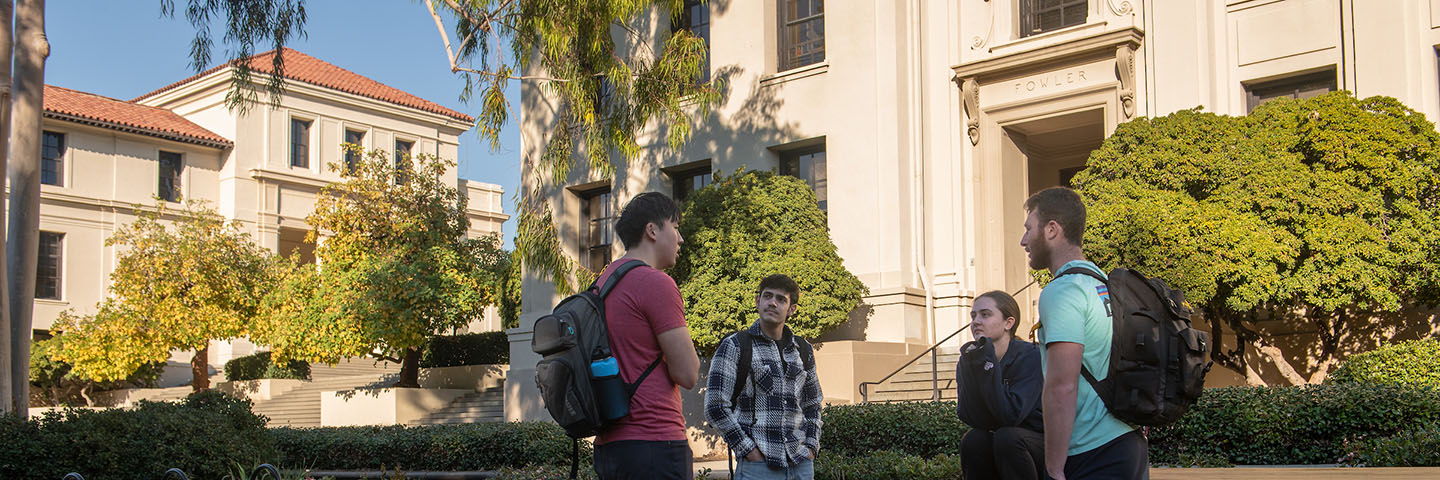
Economics majors are inspired to learn about a broad range of social and global issues. Learn about the Oxy experience for some of our current majors.

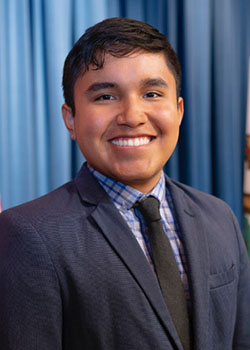
Hometown: Tualatin, OR
Major: economics minor: politics
What was your motivation to major in economics?
I was required to take economics in my senior year of high school. At this time, I had just been involved in a campaign for a school board member in my school district, where the balance between equity and budget sustainability was a central issue. Therefore, taking my high school economics class helped me, retrospectively, color aspects of the school board race’s policy debates that I had not fully understood before. This is when I first realized how valuable even a basic understanding of economics was.
When I arrived at Occidental after taking a gap year during which I interned for a statewide educational policy organization and my local state senator in Portland, I knew I wanted to take more economics classes to understand political processes better. I enrolled in Prof. Jalil’s ECON 101 class in my first semester at Oxy. I found myself deeply interested in answering the questions Prof. Jalil would weave into our class discussions based on current events and debates, particularly those around economic inequality. By the end of the course, I was convinced that economics is the language through which policy and law are most effectively understood.
Can you describe your working relationships with econ professors? Are there any standout classes you’ve taken?
My working relationship with professors is phenomenal! Coming out of the COVID-19 pandemic, I knew I wanted and needed as much engagement with faculty as possible. Since the very beginning of my time at Occidental, I have developed strong relationships with my economics professors by consistently attending office hours to ask questions about the material and to get to know them as individuals. The faculty is very involved and interested in getting to know the department’s students, even when you haven’t taken a class with them before.
For instance, in the past, I have leaned on faculty like Prof. Mora and Prof. Lopez (two professors I have never taken a class with) for making tough professional and academic calls, such as which internship to take or if I should do a late drop for a class due to an already high personal workload. Developing such relationships with my professors has allowed me to feel like I belong and that there is a robust support system across the department, which has helped overcome occasional feelings of imposter syndrome over the years as a first-generation student. I cannot recommend getting to know the Oxy economics department faculty enough! ECON 250 with Prof. Ngo is a course that has particularly stuck out to me due to the amount of effort I put into it and how rewarded I felt at the end in applying the material.
I hope to use advocacy and research grounded in economics to address the conditions necessary for the socio-economic advancement and empowerment of underprivileged groups.
What advice do you have for students who are just starting out at Oxy?
My advice for any students starting at Oxy studying economics is to be patient with yourself, especially as you take the three core economics classes. I often got frustrated with the material and with myself for feeling lost when doing homework. However, over time, I have learned to appreciate these moments as they always push me to develop a great intuitive understanding of the material. “Math, graph, and intuition!” is something Prof. Chiou would always preach in ECON 102, and it has stuck with me since my first year. If you can understand all three (particularly the intuition, in my experience), studying economics becomes so much more interesting and enjoyable.
What is your desired career track going forward? How has your economics degree helped you to determine your path?
In the future, I plan to use my economics degree to work towards solving the problem that initially pushed me to enroll in ECON 101: economic inequality. Since serving as a research assistant to Prof. Harris in my freshman and sophomore years, I have come to see that research is a crucial driver of policy and, therefore, change. I hope to use the insights I have gained from my coursework and professional experiences at Oxy (internships at the Riverside County DA’s Office, Bet Tzedek Legal Services, and Inner City Law Center) to fight economic inequality on two fronts: first as a public-interest attorney and then in the policymaking space. My economics degree has helped determine my current desired professional path by pushing me to recognize the centrality of incentives in driving micro- and macro-level economic outcomes. I hope to use advocacy and research grounded in economics to address the conditions necessary for the socio-economic advancement and empowerment of underprivileged groups.
By the end of the course, I was convinced that economics is the language through which policy and law are most effectively understood.
What was it like taking business classes through the Oxy-Caltech Exchange Program?
I took PS 123 (Regulation and Politics) and PS 141B (A History of Budgetary Politics in the United States) with Prof. Kiewiet at Caltech during my sophomore year, and I thoroughly enjoyed them! Although these courses were not explicitly business-related, they had an economics prerequisite when I took them. I was specifically drawn to PS 123 and PS 141B because I wanted a better balance between my economics and politics coursework at the time. Having taken two of Prof. Jalil’s classes at that point (who is an economic historian), I realized I wanted to study more economic history. Taking two social science-related classes at an institution known for its contributions to STEM fields allowed me to engage with a set of students who thought about regulation and economic policy differently than those at Occidental. Because socio-economic conversations are usually dominated by people studying these subjects, engaging with students who studied engineering or physics exposed me to a more evidence-based, rational form of reasoning, which I found incredibly insightful for analyzing policy.
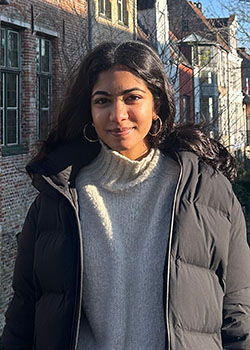
Hometown: San Jose, CA
Major: economics minor: Urban & Environmental Policy
What was your motivation to major in economics?
I came to Oxy as a tentative economics major after getting some exposure to it in high school, but my decision was affirmed when I saw how economics provides a framework to look at the issues I care about. Economics is such an expansive field, and there are ways within it to explore everything from the effects of climate change to education policy. I’ve found economics at Oxy to be the right balance of intellectually stimulating and socially relevant, and the combination of theoretical and empirical approaches has helped me better make sense of the world.
Can you describe your relationships with econ professors? Are there any standout classes you’ve taken?
The economics department is filled with incredibly smart and enthusiastic faculty that really want you to succeed, and my standout class at Oxy so far has been Behavioral Economics with Prof. Lehr. Being exposed to how people actually make decisions, while factoring in things like bias and risk preference, has both answered questions I’ve had about real world phenomena and made me more aware of the (sometimes irrational) factors that influence my own decision-making.
I’ve found economics at Oxy to be the right balance of intellectually stimulating and socially relevant, and the combination of theoretical and empirical approaches has helped me better make sense of the world.
What advice do you have for students who are just starting out at Oxy?
Ask lots of questions, be curious, and take classes across a wide variety of departments. One of the best parts of a liberal arts education is having the freedom to explore different areas in depth, which I’ve found will both deepen your understanding of your major and reveal the interconnectedness of different disciplines. Classes I’ve taken in the Urban & Environmental Policy, Diplomacy & World Affairs, and Critical Theory & Social Justice departments have been critical in shaping my worldview, and that has translated to a more comprehensive understanding of economic issues and applications.
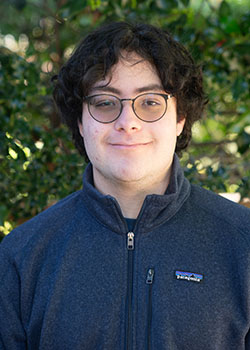
Hometown: Menlo Park, CA
Major: economics minor: Comparative Studies in Literature & Culture
What was your motivation to major in economics?
I see economics everywhere, in all facets of life, and this was clarified for me when I learned that it was the study of decision making. I am fascinated by how individuals make decisions and how these decisions interact, and it is this that keeps economics constantly exciting for me. Economics allows me to connect to theory on a personal level, while also seeing how it applies to the wider world and how it can be harnessed for good.
Can you describe your working relationships with econ professors? Are there any standout classes you’ve taken?
During my first year, I was introduced to the economics lounge in Fowler Hall. Since then, I have been grateful to build meaningful relationships with professors—even if I have not taken one of their classes—simply through casual impromptu conversations in the economics lounge. The economics department has a strong sense of community, and much of this comes from the professors' genuine interest in their students inside and outside the classroom. I've loved every economics class I've taken, and two of my favorites are Behavioral Economics with Prof. Lehr and Advanced Econometrics with Prof. Williams. Both of these classes took what we learned in prior courses and pushed them further, often adding new twists to the material.
Economics allows me to connect to theory on a personal level, while also seeing how it applies to the wider world and how it can be harnessed for good.
What is your desired career track going forward? How has your economics degree helped you to determine your path?
I am planning to work for a while before applying to law school. I have always seen my interests in law and economics as going hand-in-hand. Economics allows me to understand how people act under constraints and law allows me to see what some of those constraints are and how they work. My economics education has helped clarify how these two factors impact each other: people's decisions under given laws can change laws, and changing laws can influence people's decisions in a new way.
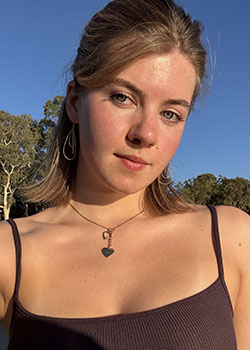
Hometown: San Jose, CA
Majors: economics, Media Arts & Culture (MAC) - critical media studies
What was your motivation to major in economics?
I’ve always been drawn towards the humanities and the arts, which is why I initially chose a MAC major. However, I’ve been taking econ coursework since my first semester at Oxy, and had been considering minoring for a while, so declaring the double major has been a long time coming for me. I’ve enjoyed double majoring because it’s made me aware of how different fields can overlap and interact with each other in really interesting ways. Economics isn’t just about math: it’s actually quite abstract. You’re working to analyze and describe patterns and make meaning out of data that’s often very visual. Turns out, this is very similar to what I do in my Critical Media Studies coursework—just with a different set of tools! As an economics student, I’ve grown as an analytical thinker and problem solver, and I’ve expanded both my quantitative and qualitative skill sets.
As an economics student, I’ve grown as an analytical thinker and problem solver, and I’ve expanded both my quantitative and qualitative skill sets.
Can you describe your working relationships with econ professors? Are there any standout classes you’ve taken?
I’ve loved working with Profs. Lopez and Ngo—their doors are always open to students, and they have been such helpful mentors, whether I’m asking about a problem set or have questions about opportunities beyond the classroom. In the spring of my sophomore year, I also took econometrics with Prof. Ritadhi. It was probably the most challenging course I’ve taken. For the first few weeks, I felt completely out of my depth. But by the end of the semester, it was like I’d learned a whole new language. With the mentorship of Prof. Ritadhi, I was able to apply econometric tools to a field I’m passionate about, studying the impact of income levels on American households’ participation in the arts in my final research paper. I learned so much, not just about the course material, but also about myself as a student: I discovered my capability to step out of my comfort zone, learn something that was completely new to me, and deliver on it.
I learned so much, not just about the course material, but also about myself as a student: I discovered my capability to step out of my comfort zone, learn something that was completely new to me, and deliver on it.
What advice do you have for students who are just starting out at Oxy?
You might feel intimidated by the idea of an econ major—don’t be! I encourage you to stick with it. The professors in this department genuinely want you to succeed, and they are here to help you. And go to peer tutoring! I would not be where I am today without the help of the econ peer tutors.
To see more Meet Our Majors profiles, visit the main page.